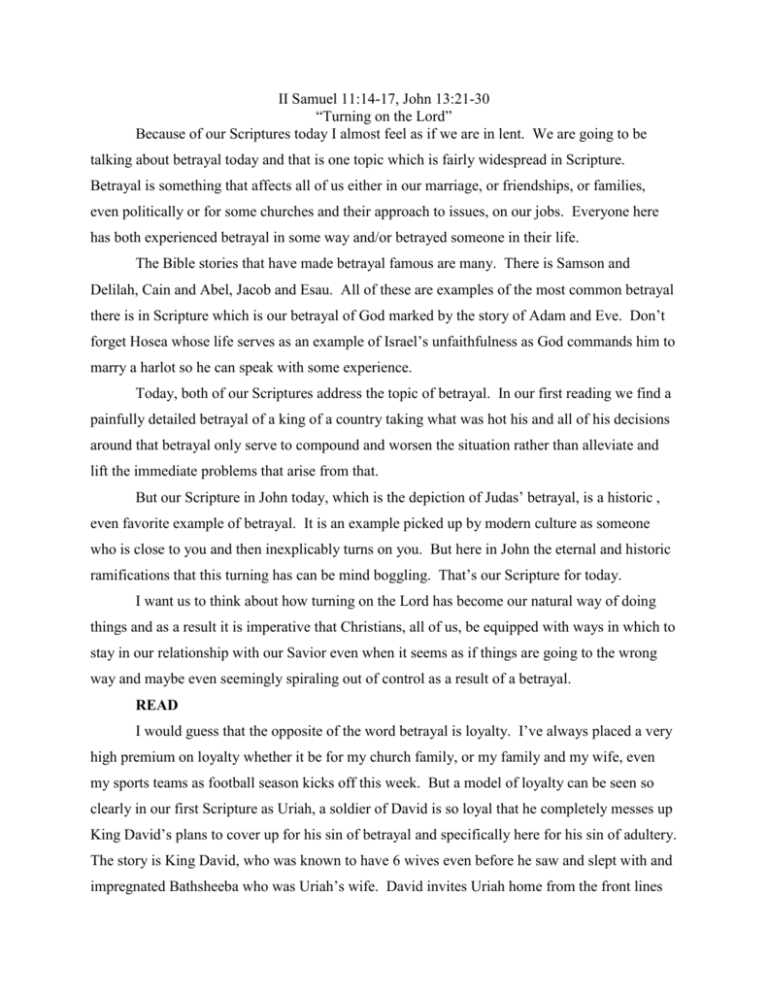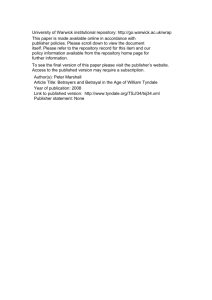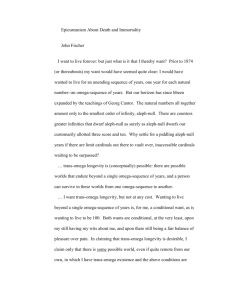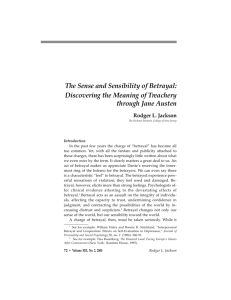SermonText-Sept.-8-2..
advertisement

II Samuel 11:14-17, John 13:21-30 “Turning on the Lord” Because of our Scriptures today I almost feel as if we are in lent. We are going to be talking about betrayal today and that is one topic which is fairly widespread in Scripture. Betrayal is something that affects all of us either in our marriage, or friendships, or families, even politically or for some churches and their approach to issues, on our jobs. Everyone here has both experienced betrayal in some way and/or betrayed someone in their life. The Bible stories that have made betrayal famous are many. There is Samson and Delilah, Cain and Abel, Jacob and Esau. All of these are examples of the most common betrayal there is in Scripture which is our betrayal of God marked by the story of Adam and Eve. Don’t forget Hosea whose life serves as an example of Israel’s unfaithfulness as God commands him to marry a harlot so he can speak with some experience. Today, both of our Scriptures address the topic of betrayal. In our first reading we find a painfully detailed betrayal of a king of a country taking what was hot his and all of his decisions around that betrayal only serve to compound and worsen the situation rather than alleviate and lift the immediate problems that arise from that. But our Scripture in John today, which is the depiction of Judas’ betrayal, is a historic , even favorite example of betrayal. It is an example picked up by modern culture as someone who is close to you and then inexplicably turns on you. But here in John the eternal and historic ramifications that this turning has can be mind boggling. That’s our Scripture for today. I want us to think about how turning on the Lord has become our natural way of doing things and as a result it is imperative that Christians, all of us, be equipped with ways in which to stay in our relationship with our Savior even when it seems as if things are going to the wrong way and maybe even seemingly spiraling out of control as a result of a betrayal. READ I would guess that the opposite of the word betrayal is loyalty. I’ve always placed a very high premium on loyalty whether it be for my church family, or my family and my wife, even my sports teams as football season kicks off this week. But a model of loyalty can be seen so clearly in our first Scripture as Uriah, a soldier of David is so loyal that he completely messes up King David’s plans to cover up for his sin of betrayal and specifically here for his sin of adultery. The story is King David, who was known to have 6 wives even before he saw and slept with and impregnated Bathsheeba who was Uriah’s wife. David invites Uriah home from the front lines to get a little R and R planning on him spending some time with his wife and therefore cover up his own indiscretion, but Uriah refuses to go home, preferring to be with his kind and stand watch outside of his gates. Since that didn’t work David’s only solution was to send Uriah to the frontline again, but this time to set up a plot to have him killed. He writes Uriah’s death sentence and gives it to Uriah to take and give to his own commander on the field. The details of this betrayal are shocking. What David was willing to do in order to cover up for his sin has to serve as a reminder to all of us that when we try to cover up our tracks, when we try to disguise our sin it only gets messier. Things have a tendency to spiral out of control and then never really get back on track. At the end of chapter 11:27b, we read that the thing that David had done displeased the Lord. That’s the quote. Betrayal is never able to be justified or made right by other sinful acts such as deception or lying. I want to avoid preaching a simple moralistic sermon where you leave only with the reinforcement of the danger and the evil of betrayal. David at first glance only betrayed Uriah. But in reality he turned on the Lord and as a result his family, his kingdom, never recovered. If David in vs. 6 had sent for Uriah and confessed his sin things would have worked out differently. Some of you may be at the beginning stages of a betrayal, now is the time to come clean, because that betrayal is not just against your wife, or your company and co-workers, it is against the Lord and when we betray the Lord things only get worse as time progresses, not better. This is so clearly played out in our John 13 passage a we look at the most classic of betrayal narratives. As I was preparing this week, Stacy and I had a running debate on how in the world was it possible for someone like Judas, who willingly gave up 3 years of his life to be a disciple of Jesus, to follow alongside with him, to see his miracles, to hear his teachings, to be one of his peeps, how was it possible that Judas turns on the Lord? We hear the usual answers that we also are able to experience years of teaching in Scripture, the miracles of the Bible, to say nothing of our own personal experiences that have strengthened our love and developed our faith in our Savior, but we still betray him and forget all of his blessings on a daily basis. But what we find in these verses is a very clear contrast between two disciples, one is Judas who is defined as the one who has Satan enter into him, and the other is the disciple whom Jesus loved who is depicted as basically lying across Jesus’ lap and laconically interested only in him. The contrast can be no more shocking if we pay attention to it and recognize that in many ways we are presented a choice between one or the other disciple after which to model our own discipleship. The first model we have is that of Judas. We have already caught a glimpse into what he is like in the beginning of chapter 12, not that long ago. We read here that Judas “did not care about the poor, but because he was a thief, he kept the common purse and used to steal what was put into it.” This is then followed up in our reading today as we find Judas again very much an integral part of the 12, just had his feet washed, has a large responsibility as the treasurer, and yet somehow he was open enough to allow Satan enter into him in order to push him over the edge to betray the Savior. John is the only one described as the disciple whom Jesus loved. We assume that it is John even though it isn’t spelled out exactly, but an educated guess tells us that it is. If you look at 19 and then again in 21 the beloved disciple is described as the one who is the witness and bearing testimony who wrote this Gospel. This disciple whom Jesus loved never left his side, was as close to him as anyone could get. He is the only one of the 12 depicted as being at the cross in 19:26. His loyalty to Jesus was unmatched, even more so than Peter who betrayed him verbally and denied him three times or the other 10 who scattered like sheep when he was arrested. The contrast between Judas and John lies in John’s ability and insistence to never leave Jesus’ side. To be a sponge for his teachings, to be hungry for his Word, to be attentive to his presence. Judas’ failure is one where he didn’t start out by saying that he would betray the Lord. We don’t begin with that premise ourselves, we never do. We are more like Peter when we say that we everyone else may turn and run, but I’ll be by your side. But somehow gradually over time the distance between him and Jesus increased, slowly but surely until we find ourselves making decisions on our own that go against Jesus’ desire for what the kingdom could be like. When we turn on the Lord it isn’t always something that we have our mind set to do. If you look at vs. 27 you see that he is confronted by a choice that Jesus makes him take. He gives Judas the bread, then Satan enters into him, and Jesus says do what you plan on doing. Right there, who knows how long and hard he had thought about it before that time, but right there he was faced with the decision of do I get deeper into this, or do I turn back toward the light, toward my Savior. He could have turned back to Christ, even with Satan in him, if he had spent more time by his side, if he had soaked up the teachings and the miracles and allowed them to shape and transform his life, but he didn’t. Shockingly Jesus is in control of even this, though. As Judas leaves, he turns his back on the light of the world and as he goes out, Scripture states that it was night. There is no more powerful verse that depicts the result of our turning on the Lord than here where it states that always, always the result of turning our back to the light of the world will be a life of pursuing darkness. Betrayal is a universal condition. Each of us face our own betrayal in different ways. Peter was faced with Jesus’ choice and he failed, but then he bounced back and chose to stay with the Savior in John 21. Judas, here in these verses, is confronted with the same decision but turns away and follows the darkness. Even after betraying our Savior he could have been brought back to the fold, but the darkness enveloped him and he saw no hope. Brothers and sisters today as we enter into a scary place in the life of our nation where we feel that one sin can be overcome with another sin of the same magnitude, do not be fooled. If we think our sin only affects those against whom we act, we are wrong. It is a betrayal against the Lord. And when that happens the repercussions, as King David discovered, far exceed our expectations. May God give us wisdom and humility to confess our sin when we turn from the Lord so that we too can be beloved disciples. Amen.












